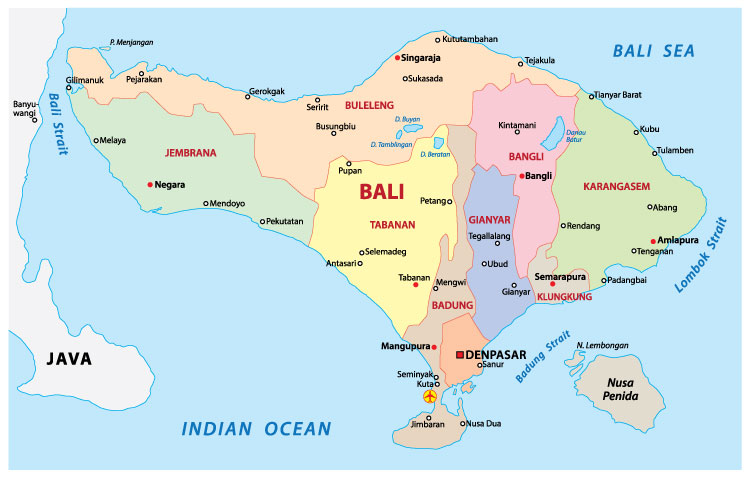The Indonesian island of Bali attracts a variety of tourists from young backpackers on a budget to more experienced and luxury travellers. The “Island of the Gods” offers complete contrasts in one package, ranging from beautiful beaches to lush green plantations; and party scene to spiritual retreats.
The island is 90km from North to South and 140km from West to East. There aren’t direct flights from the UK, popular connections include Singapore, Bangkok, Hong Kong and Kuala Lumpur.
Seasons
The dry season is from May to September and monsoon season from October to April. The best time to visit are the months of May, June and July.
Climate
Bali has a tropical monsoon climate and considered an all year round destination. Daytime temperatures on the coast range from 20-33°C, the mountains are cooler and cloudier. The rainy season which starts in October has high humidity and heavy showers. The hottest month is May and coolest January, which also tends to be the wettest. The average daily sunshine ranges from 6 hours a day in January & February, to 10 hours a day in June, July & August.
Resorts

Candidasa: Quiet & relaxed fishing village on the East coast that suffers from beach erosion
Canggu: Relaxed coastal village, a haven for surfers flocking to Echo Beach and tourists for sunset dining
Gili Islands: Consist of three small islands including Gili Trawangan, Gili Meno and Gili Air situated off the coast of Lombok, popular for a remote island experience
Jimbaran: Beach resort with 5* luxury hotels and seafood restaurants. Famous for the 2005 Bali bombings
Kerobokan: Affordable luxury hotels & villas popular for honeymoons. Famous for its prison which is definitely not a place to stay
Kuta: In expensive fun and party holidays with busy beaches, surfing and nightlife. Famous for the Kuta Cowboys sex industry
Legian: Beachfront town situated between Kuta and Seminyak, more relaxed and less chaotic without the crowds, also popular for surfing
Lombok: The undiscovered neighouring island to Bali, with white sand beaches, forest and surf. Famous for Gunung Rinjani the 2nd highest volcano in Indonesia with hot springs and lake
Nusa Dua: Developed as a 5* all inclusive resort with world class hotels, 18-hole golf course and beautiful sandy beaches
Sanur: Seaside town with a long shallow beach, classy and quiet
Seminyak: Beach resort with luxury hotels, high end shops, bars, restaurants and clubs
Tanjung Benoa: On the Bukit Peninsula in South Bali the old dock and fishing village was developed into a medium class beach front resort
Tembok: A coastal village in North East Bali with a dramatic volcanic landscape. Famous for Batur Natural Hot Spring and active volcano Gunung Batur
Ubud: Mountain resort home to the Hanging Gardens, temples and Balinese crafts
Ungasan: Home to the Banyan Tree luxury cliff top retreat & spa
Uluwatu: The best place to stay to access the top surfing spots in Bali
Airports
Ngurah Rai International Airport, also known as Denpasar International Airport (DPS), is the main airport in Bali, located 13 km south of Denpasar.
Currency
The Indonesian Rupiah (IDR) is the official currency of Indonesia.
Language
Indonesian and Balinese are the main languages spoken in Bali, followed by English and Chinese.
Time Zone
Bali is situated within WITA (Waktu Indonesia Tengah). UTC+08:00
Tourism
Bali’s tourism target was to reach 4 million visitors by 2015. The provincial tourism office of Bali confirmed that 3.76 million tourists visited the island in 2014, which was an increase of 14.94% compared to 3.27 million tourists the previous year.
Entry Requirements
The UK is one of 140 countries that don’t require a visa to enter Indonesia, the Free Entry stamp is valid for 30 days and cannot be extended. If you are intending to stay for longer, you can apply for a Visa on Arrival which costs 35 US$ and is valid for 30 days, this can be extended once to cover a further 30 days.
Your passport must be valid for a minimum of 6 months from the date of entry into Indonesia, and must have at least a page free for the entry stamp.
Health
Care should be taken to avoid being bitten by mosquitos when visiting Bali, travellers are at risk of contracting Malaria and Dengue Fever in Bali, which is heightened during the rainy season. Avian Influenza (bird flu) is a low risk and normally associated with close contact with poultry, make sure chicken and egg dishes are cooked thoroughly before consuming. Hepatitis A vaccination is recommended for all travellers, and Typhoid if you may be eating or drinking outside the resorts.


